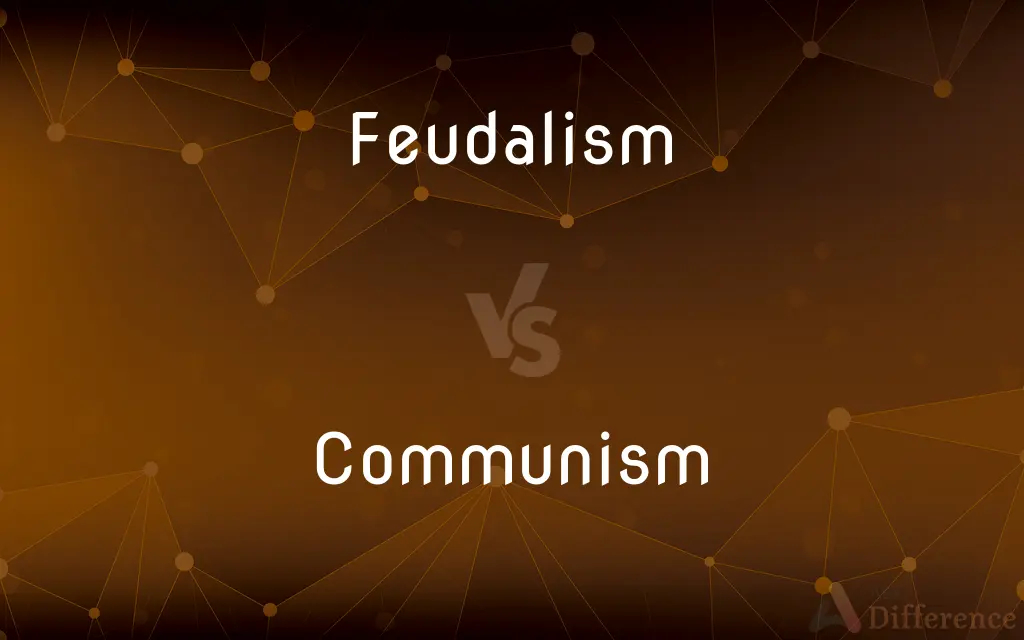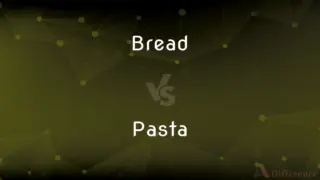Feudalism vs. Communism — What's the Difference?
By Maham Liaqat & Urooj Arif — Updated on March 19, 2024
Feudalism centers on hierarchical relationships based on land ownership, while communism aims for a classless society where property is communally owned.

Difference Between Feudalism and Communism
Table of Contents
ADVERTISEMENT
Key Differences
Feudalism, a socio-economic system prevalent in medieval Europe, relies on a hierarchy of lords and vassals, where land ownership and duties define relationships. Landlords provide protection and land to vassals in exchange for military service or labor. Communism, on the other hand, advocates for a classless society where the means of production are owned collectively, aiming to eliminate class distinctions and private property.
Under feudalism, society is divided into distinct classes, including nobility, clergy, and peasants or serfs, with each class having specific roles and obligations. This system creates a rigid social structure based on birthright and land ownership. Whereas, communism seeks to abolish such class divisions by promoting a system in which all members of society contribute to and benefit equally from the collective labor.
Feudalism's economic system is based on agriculture and the feudal duties that serfs owe to their lords, such as a portion of their produce or labor on the lord's land. This creates a dependency relationship between serfs and lords. In contrast, communism proposes an economy where goods and services are produced based on societal needs and distributed according to each individual's ability and needs.
In feudalism, political power is decentralized, with local lords wielding significant control over their territories, often acting as judge, military leader, and administrator. Communism envisions a centralized government that coordinates economic activities and distribution of resources, theoretically leading to a more equitable society.
The transition from feudalism to other economic systems often involved gradual shifts in power and social structures, driven by economic, technological, and ideological changes. Communism, however, advocates for a revolutionary approach to dismantle existing capitalist systems and replace them with a communist society through radical social and political change.
ADVERTISEMENT
Comparison Chart
Definition
A medieval European social system based on land ownership and duties.
A political and economic ideology aiming for a classless society with communal property ownership.
Economic Basis
Agriculture, with peasants working land owned by lords.
Collective ownership of the means of production, with no private property.
Social Structure
Hierarchical, with clear distinctions between classes (lords, vassals, serfs).
Classless, aiming to eliminate societal divisions based on economic status.
Political System
Decentralized, with local lords holding power.
Centralized government controls production and distribution.
Ownership
Land and production means are privately owned by the nobility.
All property is communally owned, with no individual possession.
Compare with Definitions
Feudalism
Characterized by a rigid class structure.
The feudal system was structured with clear class divisions, from serfs to the nobility.
Communism
Seeks to abolish private property to eliminate class distinctions.
In a communist society, personal possessions exist, but production means are communal.
Feudalism
A hierarchical system where land ownership defines power and responsibility.
In feudalism, a lord granted land to vassals in exchange for military service.
Communism
Emphasizes equality and equitable distribution of resources.
Communism aims for a society where goods are distributed based on need.
Feudalism
Predominantly agricultural, with serfs working the land for their lord.
Serfs in feudalism were bound to the land, cultivating it for their lord's benefit.
Communism
Advocates for a classless society with communal ownership of production means.
Communism envisions a world where workers collectively own factories and land.
Feudalism
Transition involved shifts towards centralization and capitalist structures.
The decline of feudalism saw the rise of nation-states and the growth of commerce.
Communism
Envisions a centralized government to manage economy and society.
Communism typically involves a strong central government to ensure equitable distribution.
Feudalism
Local lords wield significant autonomous power.
Feudal lords acted as the local judiciary, military, and administrative authority.
Communism
Promotes revolutionary change to establish its ideals.
Communists often support revolutionary action to overthrow capitalist systems.
Feudalism
Feudalism, also known as the feudal system, was the combination of the legal, economic, military, and cultural customs that flourished in Medieval Europe between the 9th and 15th centuries. Broadly defined, it was a way of structuring society around relationships that were derived from the holding of land in exchange for service or labor.
Communism
Communism (from Latin communis, 'common, universal') is a philosophical, social, political, and economic ideology and movement whose ultimate goal is the establishment of a communist society, namely a socioeconomic order structured upon the ideas of common ownership of the means of production and the absence of social classes, money, and, in some cases, the state. As such, communism is a specific form of socialism.
Feudalism
A political and economic system of Europe from the 9th to about the 15th century, based on the holding of all land in fief or fee and the resulting relation of lord to vassal and characterized by homage, legal and military service of tenants, and forfeiture.
Communism
A theoretical economic system characterized by the collective ownership of property and by the organization of labor for the common advantage of all members.
Feudalism
A political, economic, or social order resembling this medieval system.
Communism
A system of government in which the state plans and controls the economy and a single, often authoritarian party holds power, claiming to make progress toward a higher social order in which all goods are equally shared by the people.
Feudalism
A social system based on personal ownership of resources and personal fealty between a suzerain (lord) and a vassal (subject). Defining characteristics are direct ownership of resources, personal loyalty, and a hierarchical social structure reinforced by religion.
Communism
The Marxist-Leninist doctrine advocating revolution to overthrow the capitalist system and establish a dictatorship of the proletariat that will eventually evolve into a perfectly egalitarian and communal society.
Feudalism
The feudal system; a system by which the holding of estates in land is made dependent upon an obligation to render military service to the king or feudal superior; feudal principles and usages.
Communism
Any far-left political ideology or philosophy advocating holding the production of resources collectively, especially by seizing it through revolution.
Feudalism
The social system that developed in Europe in the 8th C; vassals were protected by lords who they had to serve in war
Communism
Any political social system that implements a communist political philosophy.
Communism
The international socialist society where classes, money, and the state no longer exist.
Communism
A scheme of equalizing the social conditions of life; specifically, a scheme which contemplates the abolition of inequalities in the possession of property, as by distributing all wealth equally to all, or by holding all wealth in common for the equal use and advantage of all.
Communism
A form of socialism that abolishes private ownership
Communism
A political theory favoring collectivism in a classless society
Common Curiosities
What are the economic bases of feudalism and communism?
Feudalism is based on agriculture and serfdom, whereas communism focuses on collective ownership and production.
What is feudalism?
Feudalism is a medieval system where land ownership and obligations define social and economic relationships.
What is communism?
Communism is an ideology that seeks to create a classless society with communal ownership of the means of production.
How does feudalism's social structure compare to communism?
Feudalism has a rigid class hierarchy, while communism aims for a classless society.
How do feudalism and communism approach the distribution of resources?
Feudalism's distribution is based on land ownership and hierarchy, while communism aims for equitable distribution based on need.
What is the role of private property in feudalism and communism?
In feudalism, private property defines social status and power; communism seeks to eliminate private property to ensure equality.
How does communism propose to change society?
Communism advocates for revolutionary change to dismantle capitalist structures and establish a communal system.
What are the criticisms of feudalism?
Critics argue feudalism perpetuates inequality and restricts social mobility and economic progress.
How do political systems under feudalism and communism differ?
Feudalism features decentralized power held by local lords, while communism advocates for a centralized government.
Can communism and feudalism coexist?
Due to their fundamentally different principles and goals, communism and feudalism cannot coexist.
How does communism address class distinctions?
Communism aims to abolish class distinctions by eliminating private property and ensuring communal ownership.
What leads to the transition away from feudalism?
Economic, technological, and ideological shifts lead to the decline of feudalism, favoring centralization and commerce.
What are the criticisms of communism?
Criticisms of communism include potential for government overreach, inefficiency, and suppression of individual freedoms.
How have historical implementations of communism differed from its ideals?
In practice, many communist regimes have struggled with economic inefficiency, lack of political freedoms, and deviation from the ideal of a classless society.
What role does agriculture play in feudalism?
Agriculture is the economic foundation of feudalism, with serfs working the land for their lords.
Share Your Discovery

Previous Comparison
Scratch vs. Gouge
Next Comparison
Bread vs. PastaAuthor Spotlight
Written by
Maham LiaqatCo-written by
Urooj ArifUrooj is a skilled content writer at Ask Difference, known for her exceptional ability to simplify complex topics into engaging and informative content. With a passion for research and a flair for clear, concise writing, she consistently delivers articles that resonate with our diverse audience.













































